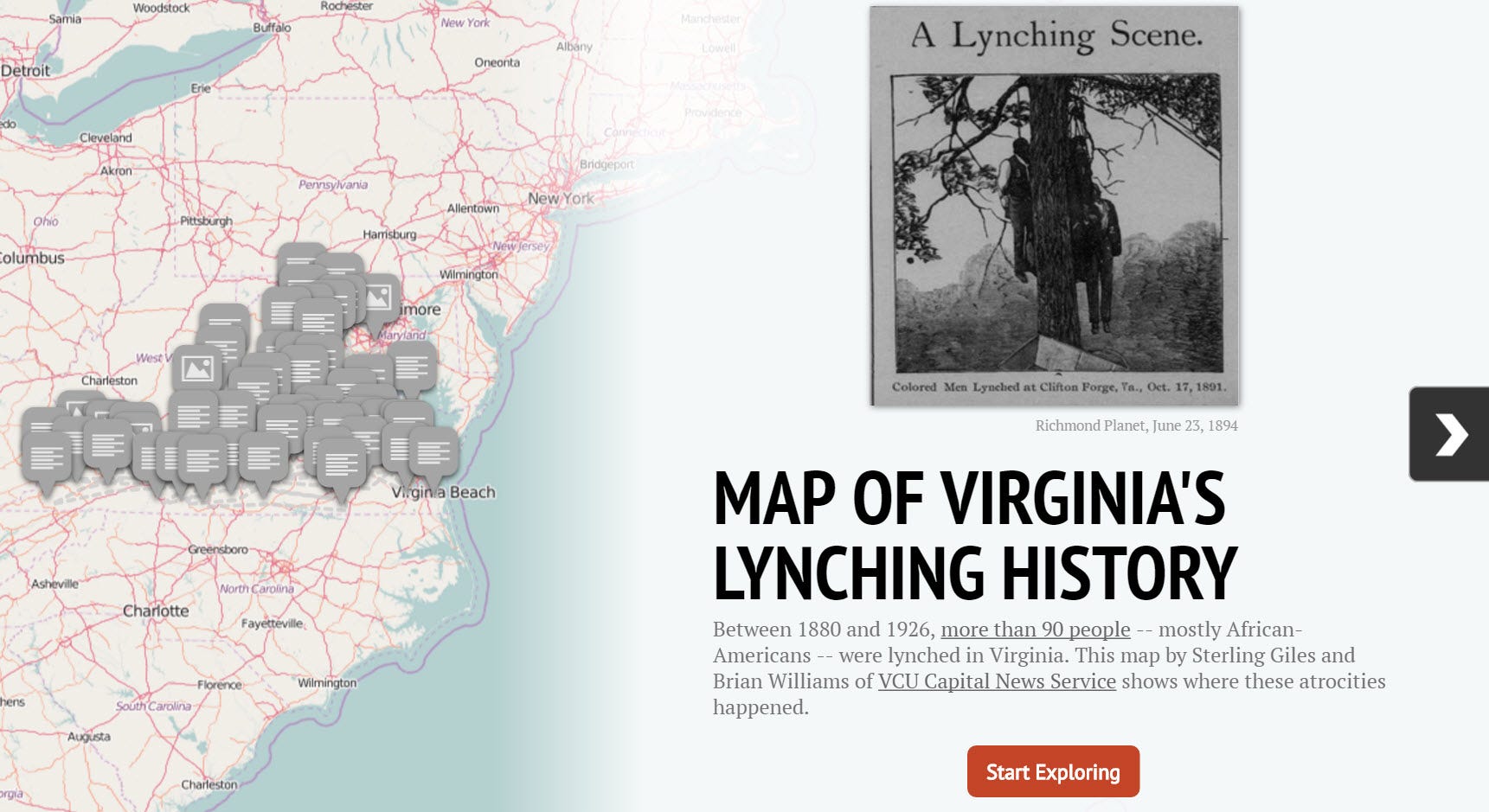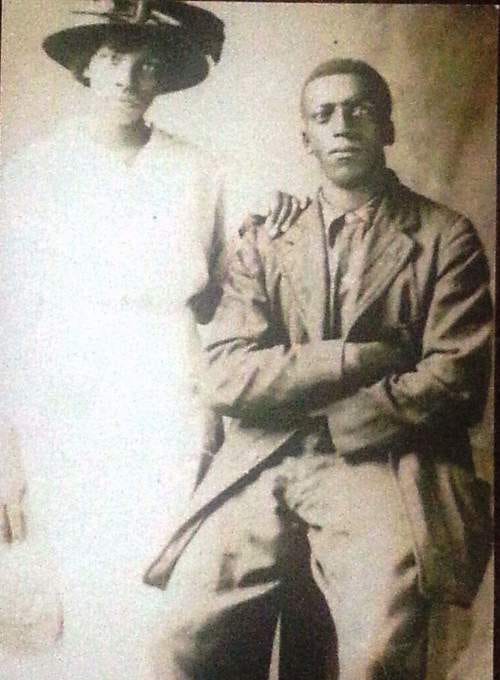Too Late for Justice?
"Raymond Byrd, coloured, who was in Wytheville jail charged with a statutory offence against a white woman, pending a hearing, was killed Saturday night between 1 and 2 o'clock by a mob of possibly fifty persons."
"The negro was shot in his cell and the body taken away by the mob. The body was left hanging to a tree about one mile west of the St. Paul's church."
Brief news item, August 1926 lynching, Wytheville Virginia
"Stay in your place, that was the rule. You get out of your place, you're in trouble."
"I wanted to know what happened, why it happened, who was involved, the whole detail about it."
"I'm the keeper of the secret. I've got the names, and I don't really right now know what to do with them before I die. And I've got to do something with them before I die."
"I know if I start to say something they'll tell me to shut the hell up."
"He looked straight at me. He said, 'Son, I'm not going to talk to you about it. You don't need to know nothing about that'. I was looking at him. I said, 'Damn, are you that frightened? Are you that scared? I said, 'Does it still bother you'?"
"See, I'm not a white guy with these names. I'm a Black guy with these names. I want the history out there. I want people to be prosecuted, but right now it's beyond the time. I wish there would be some way that you could get those descendants still living to sit down at a table and say, you know, we're sorry for what happened. And be honest about it. And don't go home and say 'Well, I didn't have to say that to the n----r, but I did'. I just want them to say, 'I'm sorry for what happened for what my grandfather or great-grandfather did'. Don't keep hiding. Tell people you know it. Admit it. I want them to admit it."
"Right here is where the jail sat. That's where they shot him and beat him. They put him behind the car and drug him all along here. Back then, it [the road] might have been dirt. Right here is where they stopped and put the body in the back. They put the body in the rumble seat."
"From here, they drove to St.Paul's church. See? They brought that man all the way up here to hang him. Can you believe that? They drove that man up this road, over by this church."
"You see, they point the dead to the east. That's because Christ is coming the second time to the east. They point to the east to see the coming of Christ. When I drive this road now, I get a certain feeling. It was in these woods. Can you see it?"
John Johnson, 80, black resident of Wytheville, Virginia
"The morning we found out that my father had been hung, we children -- my mother didn't have anything to feed us for breakfast but cold beans."
"Them old white people, I hate 'em all. I just don't want 'em around me. I don't trust 'em. The only thing I think about when I see 'em is bringing blood."
Daughter of Raymond Byrd and Tennessee Hawkins
"I've been thinking about that too, lately [what to do with the accumulated evidence collected].Maybe putting it in something more formally -- not a publication, John. I've got relatives all over the county and I don't want to hurt them. We're not up to making people feel bad about their ancestors."
"Being eight generations, I feel very connected to them and wouldn't want them to be negative toward me. I'm not guilty of any of that, nobody today is guilty of that."
Beverly Repass Hoch, 77, white resident of Wytheville, Virginia
 |
| 1926 New York Times Raymond Byrd headline |
Raymond Byrd, likely born at the close of the 19th Century in small town Wytheville, Virginia, a railroad town. was a member of the 806th Pioneer Infantry in France, serving with his country during the First World War. When he returned from the war to Wytheville, he worked for a white farmer, Grover Grubb. The farmer's daughter was named Minnie. She and Raymond had had an affair, and she became pregnant. Eventually Minnie gave birth to a little girl, and her father accused Raymond of having raped his daughter. Minnie was never heard to say she had been raped, ever.
Raymond brought the baby, which the white farmer refused to acknowledge, to John Johnson's uncle, 94 when John had interviewed him, and who said "He couldn't find no body to take her and he was going to take her to the woods. So I guess he was going to kill her I reckon. And so my wife was so tender hearted, and every thing you know, and said she would take it if they coulden find somebody to keep it." In fact it seemed the child was raised by a member of the Johnson family and later in life joined her mother, then living in Ohio.
A statement from the sheriff of the time described deputies firing a shot on a ridge signalling that they had arrested Raymond Byrd. An armed mob had assembled at farmer Grubb's farm. In the sheriff's statement the screen door that was all that stood between Raymond Byrd in his jail cell, from the mob that had come for him at the Wythe County jail. Some in the mob wore disguises. Byrd was shot in the chest, his head battered with clubs and rifle butts. Then his body dragged a distance through town behind a Model T Ford, then driven out near Grubb's farm, and hung from a tree where a crowd of possibly hundreds had assembled.

When John Johnson was growing up he heard rumours of the event. When he reached thirty, he began to look into the details, ask questions and began assembling a file. Decades have passed and he's now an old man. He has a friendship with a white woman who has an interest in local history and who has given him assistance in finding some hints regarding the identities of the local men who had been part of the hanging group who had murdered Raymond Byrd. The town had no interest at the time of the lynching to prosecute or hold anyone responsible.
And that disinterest and cover up has continued to the present day. Many of the town's citizens have some link through family ties to those who had taken part in the lynching. Many of their family members had been among the hundreds of cheering spectators. No one has been held accountable, though larger towns and cities and news outlets in the state were ostensibly aghast at the commission of such a crime.
Mr. Johnson's father had told him that he had himself been among a group of Black men who undertook to guard the Wythe County jail the night the mob came to kill Raymond Byrd. That motivated John Johnson to look for other Blacks who were acquaintances and friends of his father who might have more information to give him. He received responses such as "You don't need to know about that." Or "Pull those shades down -- I don't want white people to know you and I are talking", in fear of bricks thrown through windows.
 |
| Raymond and Tennessee (Tennie) Bird | Photo with permission of the Hayes-Quinn family |
Labels: Justice, Lynching, U.S. Virginia
0 Comments:
Post a Comment
<< Home